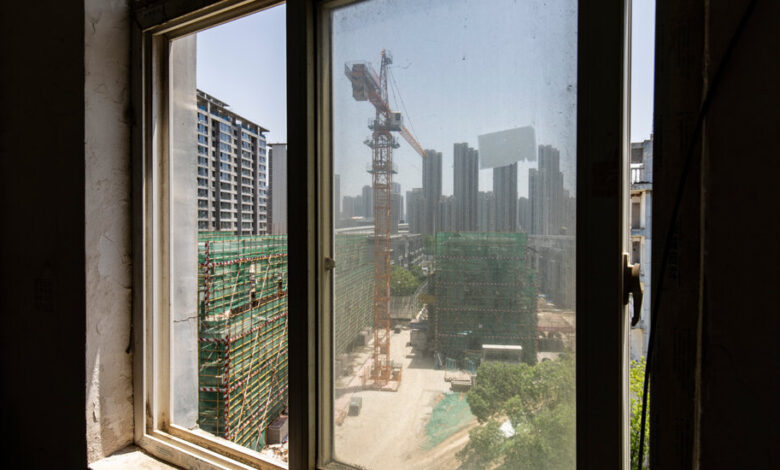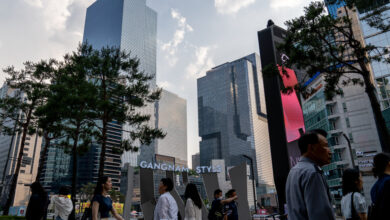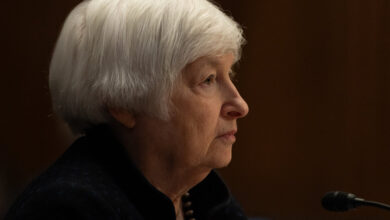Guess Who’s Angry at China’s Real Estate Bailout: Homeowners

For much of the past decade, China’s efforts to curb speculation on real estate grew broader and more extensive.
Shanghai declared that anyone who got a divorce would be subject to restrictions on apartment buying for three years, to counter couples who were splitting up just so they could buy second homes as investments. In Chengdu, in western China, only local residents who paid social welfare taxes and drew a winning ticket in a lottery could buy a new place. In the city of Tangshan, in the country’s northeast, anyone buying a home had to hold the property for at least three and a half years.
Those restrictions, along with limitations in other regions, have been lifted as China tries to revive a severe property downturn. Since last year, more than 25 Chinese cities have eliminated all restrictions on real estate purchases, as many local governments scrapped rules that prevented developers from cutting prices.
Last month, the central government went further. It lowered down-payment requirements and relaxed mortgage rules, and urged local governments to buy unsold homes and convert them into public housing.
But some of China’s efforts to stimulate home buying have upset one of the country’s most vocal constituencies: existing homeowners.
Many Chinese homeowners, who pinched and saved to buy apartments that serve as a main household investment, are now worried that the relaxing of restrictions will depress prices for their properties. The new policies have given rise to a dose of NIMBY-ism, short for “not in my backyard,” in a country ruled by the Communist Party.
The government must thread a needle as it tries to address the collapse of an industry that accounts for a quarter of the Chinese economy. While discontent over the economy could shake social stability, so could a backlash by homeowners, many of whom are holding on to hope that their properties will build wealth for future generations.
Many of the restrictions were lifted by the same policymakers who had introduced the rules only a few years earlier to adhere to the decree by China’s leader, Xi Jinping, that “houses are for living, not for speculation.”
When Chengdu lifted its restrictions in late April, one person lodged a complaint on a government website saying it was unfair to people who had earned the right to buy homes when the rules were in place. The complaint said the person had moved to Chengdu and paid social security taxes for several years to be eligible to buy a house.
“I regarded being qualified to buy a house in Chengdu as an honor and proof of how hard I worked,” the individual wrote. But now anyone can buy a home, even those “who made no contribution” to the city. The person asked that officials “restore the purchase restrictions as soon as possible.”
In recent years, one of China’s rare acts of defiance came from homeowners. Starting in 2022, hundreds of thousands of Chinese homeowners banded together and refused to pay loans on half-finished properties. Since then, the government has put a priority on policies that urge developers to finish construction on sold properties.
Alicia Garcia-Herrero, chief economist for the Asia-Pacific region at the investment bank Natixis, said it was difficult to encourage buying by removing restrictions because it reinforced concerns that there was something wrong with the market.
“It’s very hard to lift them in time — it’s usually too late,” Ms. Garcia-Herrero said. “It is not a solution by any measure.”
The prices for new homes in China’s biggest cities have fallen for 11 straight months. In April, they fell 0.6 percent from the prior month, according to China’s National Bureau of Statistics. Prices fell by a similar amount in smaller second- and third-tier cities as well.
The plunge in prices is a recent phenomenon. Local and city governments had prevented real estate firms from cutting prices drastically. The controls were put in place to thwart developers from jacking up prices too aggressively.
But around the end of last year, as the slowdown lingered, and it became harder to sell homes, local authorities started allowing developers to slash prices.
Chengdu officials in November, responding to a complaint left on a government website, penalized a local developer for cutting prices below list price, saying the project was “disrupting the normal order of the real estate market.”
Five months later, another homeowner complaint about developers that were cutting prices got the brushoff. Chengdu officials said it was not taking any action because the developer was using a “market-adjusted price.”
In the central city of Xi’an, Fayre Liu bought a four-bedroom apartment for about $420,000 in January. Later, she discovered that Poly Group, a state-owned developer, was offering more recent buyers discounts of about $40,000 on similar apartments. She said she had learned the developer’s sales people pressured buyers to make a down payment and then announced major discounts one day after receiving the deposits.
“Anyone would be very furious,” Ms. Liu, 27, said. “You’re completely defrauding consumers.”
Ms. Liu said homeowners in her apartment complex had called the Xi’an mayor’s office to demand that they receive compensation equivalent to the discounts. The authorities responded that they had no right to halt the discounts, comparing them to a sale at a shopping mall.
The protesting homeowners feared that Poly would cut corners on construction to offset the money lost from discounts. When some homeowners went to Poly’s offices, they were confronted by police officers who warned them not to make trouble or disturb the state-owned enterprise’s business.
“This is collusion between the government and developers,” Ms. Liu said.
Poly did not respond to an email seeking comment.
The government’s relaxation on price cuts addresses two protracted problems.
First, it allows money to flow to debt-laden developers to make interest payments and repay loans. Second, it whittles away the inventory of unsold homes. The Australian banking group ANZ estimated that it would take 3.6 years to process all the unsold residential properties in China, 50 percent longer than in the country’s last major real estate slump in 2014.
The government initiative, announced last month, to convert unsold homes into subsidized housing has been a particular cause of friction. Some homeowners are unhappy about the mixing of public housing and private developments.
Last month, someone filed a complaint on the Sichuan Province website about a local state-owned company’s turning some of its new houses into public housing. The person, who had bought a home in that complex two years earlier, said over 100 new apartments were being turned into public housing without any consultation with existing homeowners. In the complaint, the individual expressed displeasure about having to pay high prices for the property yet receiving the “quality of public housing.”
“The value of the community has plummeted,” the person wrote. “Property owners who have bought homes are suffering unspeakable misery.”
In a response to the complaint, the state-owned firm said that it was supporting national policy and that the homes were subject to “market regulated price management.”
Kevin Duan, who bought an apartment in an almost finished complex in the central Chinese city of Changsha, said one of the compound’s 20 buildings would become public housing. He said homeowners were furious and demanded that the affordable housing be segregated from the rest of the complex.
“A commercial housing community should not have public rental housing,” Mr. Duan said. “If I had known it was a complex with public housing from the beginning, I definitely would not have considered it.”



